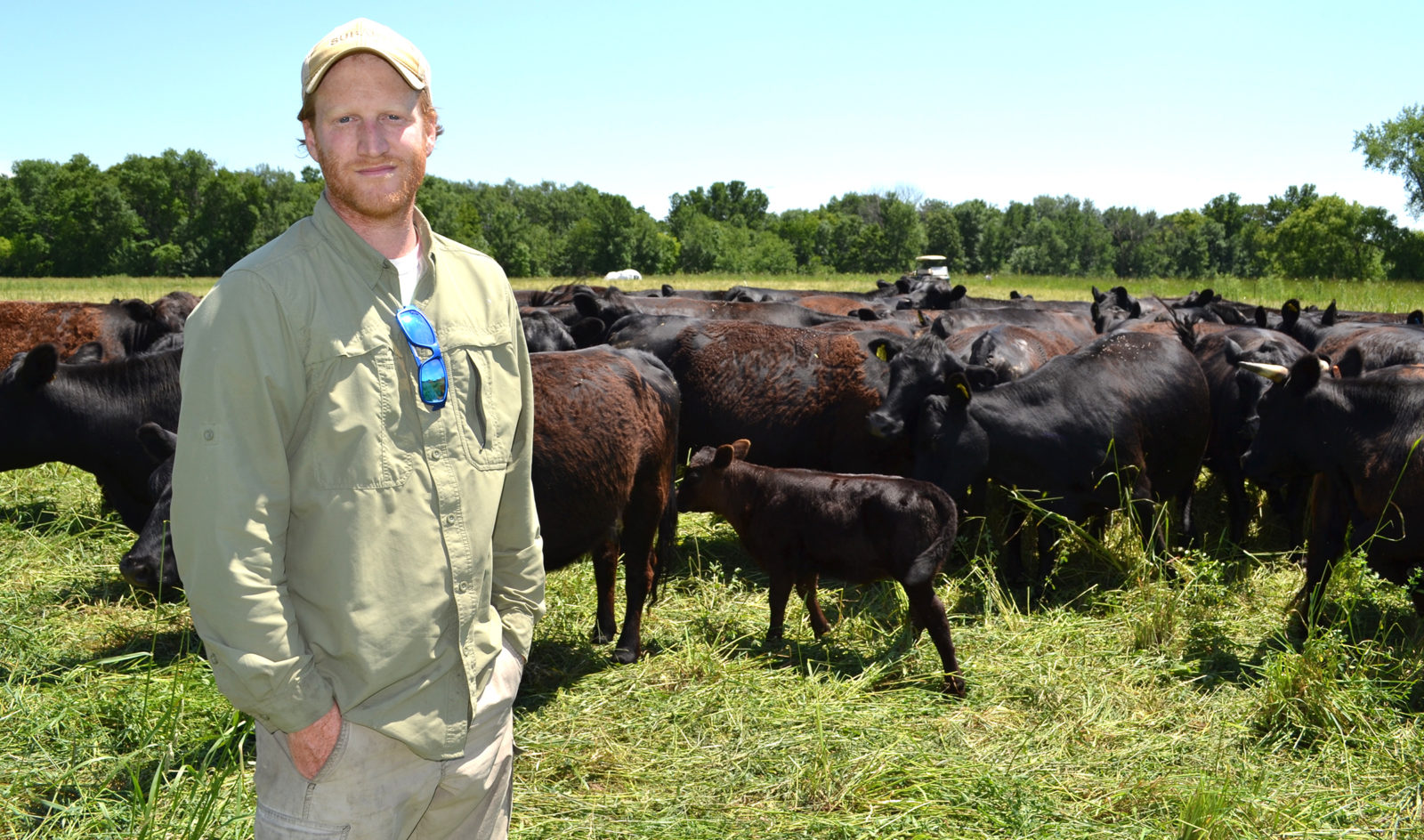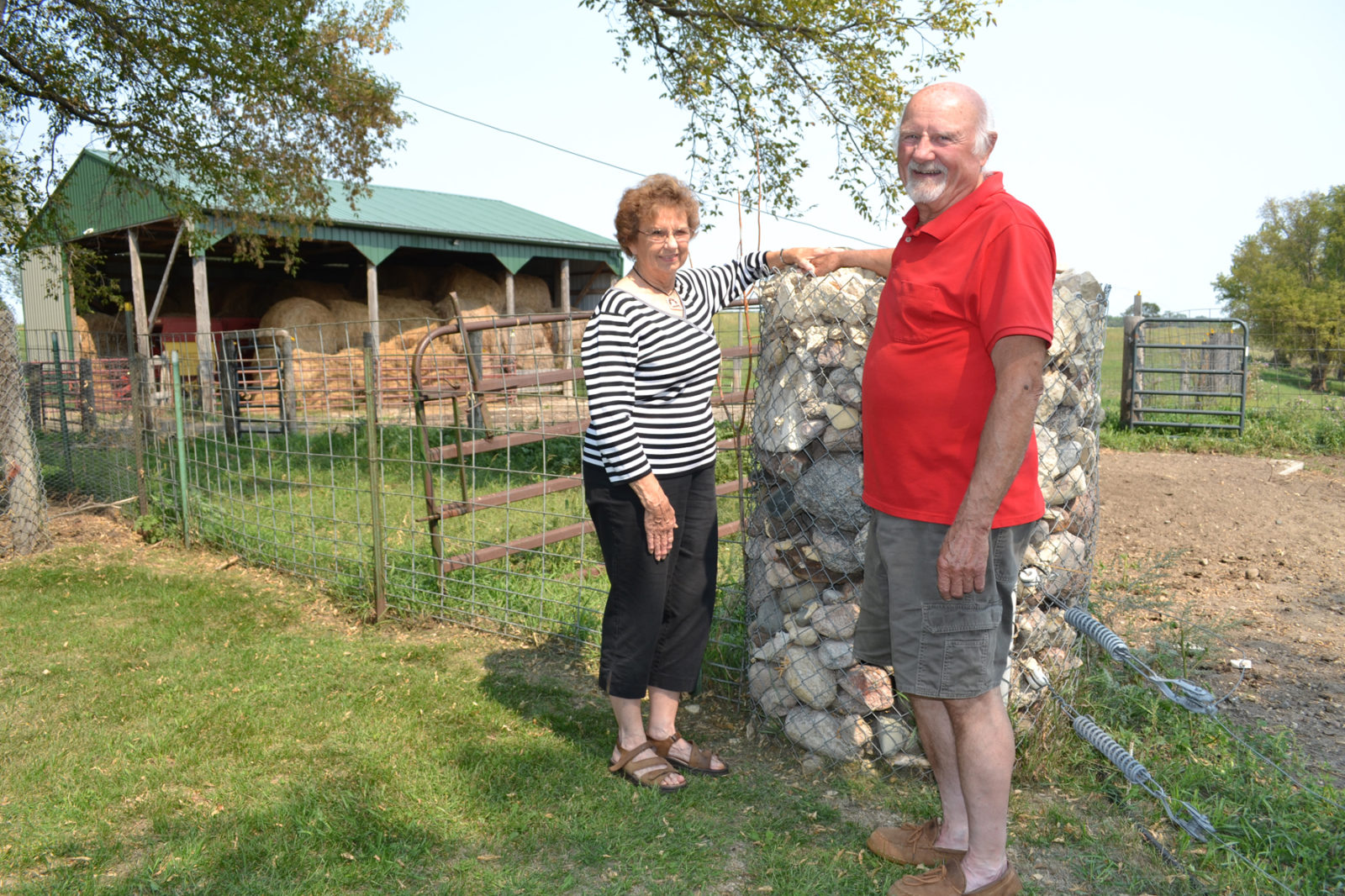The call came in the night. On the end of the line was the panicked voice of Tyler Carlson, a 26-year-old beginning farmer who was starting a grazing operation in west-central Minnesota. It seems that while making a long-distance move of the cowherd he had just purchased a few days before, a baby calf had gotten separated from its mother. It was dark, coyotes were on the prowl and Carlson had just spent a few fruitless hours trying to chase the confused calf down. What to do?
The advice offered by the receivers of the call, beef producers Don and Helen Berheim, was to leave the animals alone—the cow and calf would find each other during the night.
“Sure enough, come morning they were together,” says Carlson. “It’s great to be able to make that call, and sometimes what you learn is there are certain things you have to let go. There are so many things they don’t teach in the books.”

Farmer Network
Indeed, there are many things they don’t teach in books. And that’s a primary reason why the Land Stewardship Project’s Farm Beginnings Program has created the Farmer Network. The Network is a group of over 130 producers who represent a broad spectrum of farming enterprises. Members of the Farmer Network share their experiences and provide informal mentoring to those in the beginning to intermediate stages of production agriculture. Many of these farmers are also presenters at field days, tours and winter workshops through LSP and other farmer training organizations.
Carlson’s relationship with the Berheims is an example of how a connection forged as a result of the Farmer Network can evolve from a simple exchange of goods and information to a mutually rewarding relationship.
“That’s been probably the most phenomenal connection I’ve made,” says Carlson of the relationship he’s developed with the Berheims during the past several months.
Don Berheim says the feeling is mutual. “It has become immensely satisfying and enjoyable to be around all that energy and passion,” he says.
Connecting Ag & the Ecosystem
A major reason Carlson and the Berheims have developed such a deep mentor-mentee bond is they have a similar philosophy when it comes to farming, land stewardship and livestock’s role in making it possible.
For Carlson, it started when he was studying sustainable agriculture and restoration ecology at the University of Minnesota. While in college, he took a plant physiology course with the late Bud Markhart, a horticulture professor who focused on organic farming systems.
“Bud Markhart blew my mind every day,” Carlson says. Specifically, he became fascinated by the role perennial systems like grasslands and forests could play in restoring the ecological balance on a farm. “I was interested in where landscape ecology meets agriculture.”
After graduating in 2010, Carlson interned at Moonstone Farm, a western Minnesota operation that over the years has transitioned from raising row crops to a system based on perennial plants. There Carlson learned how rotationally grazing livestock such as cattle can be used to not only add value to perennial plants such as grass, but actually improve the environmental health of the land. Moonstone’s owners, Audrey Arner and Richard Handeen, encouraged Carlson to take LSP’s Farm Dreams course, a one-day workshop that helps participants determine if farming is for them and if so, the best way to step onto that career path.
Farm Dreams helped Carlson figure out that LSP’s Farm Beginnings was the natural next step if he was to set up a farming operation. Carlson enrolled in the 2011-2012 class and last fall and winter traveled twice-a-month to Hutchinson, Minn., for workshops led by established farmers and other ag professionals in the area. Through the class, he learned about business planning, marketing and goal setting. Carlson says the class showed him how it was possible to combine agroecological restoration with profitable farming.
“I got really excited about grass-fed beef and carbon sequestration and all of that,” he says.
And he has access to some land to try out his ideas—Carlson’s family owns 200 acres near Sauk Centre. About 80 acres is farmable, and it has been growing row crops and alfalfa for the past several years. Carlson’s goal is to convert some of that 80 acres to a “silvo-pasture” system where cattle are able to graze in-between double rows of trees. The system, which has been used with success in states like Missouri and Georgia, provides shelter for the cattle, protects the soil, preserves water, provides wildlife habitat, shades cool season grasses and sequesters large amounts of carbon. The elongated grazing “paddocks” are 300 to 400 feet long, with 20-foot alleys between the double rows of trees spaced seven feet apart.
“Each alley provided about a day’s worth of grazing for the seven steers we had this year,” says Carlson.
This spring he planted around 6,500 red oak, red pine, Norway pine and white pine with the help of cost share funds from the Natural Resources Conservation Service. The farm is now a U of M demonstration site for silvo-pasturing, which is a relatively new concept in Minnesota.
Such a system relies on cattle, of course, to make use of that forage and make the system economically viable. That’s where the Berheims enter the picture.
Networking
While enrolled in Farm Beginnings, Carlson had learned of the Farmer Network and how important continued connections with established farmers can be to the success of a new operation. That’s why, while looking for cattle last winter that would do well in a pasture system, he contacted Parker Forsell, who coordinates the Farmer Network. He told Forsell he was looking for a few head of brood cows to start a grass-based beef herd. Parker put the word out through the Network’s e-mail list. As it happened, the Berheims had already provided brood cattle to around half-a-dozen beginning farmers in recent years.
Since they started raising grass-based beef on their 200-acre farm near Benson, Minn., in 2004, the Berheims’ herd has been steadily growing. About the time Carlson put the word out about his need for cattle, they were looking to trim their herd.
“It really is satisfying when you have a good product and you can help someone out,” says Don.
Carlson contacted the Berheims and eventually made the hour drive to visit their farm. What he found was an operation that’s doing exactly what he’d like to do eventually on his land: using cattle to improve the ecosystem in a financially viable manner.
The Berheims feel their land’s health and productivity is better than it’s ever been. The pastures were previously overgrazed, and where it was tilled, there is “basically no topsoil,” says Don.
“It’s really satisfying to me to see the land being restored,” says Don. “The cattle are in the best flesh they’ve ever been in, and I think it’s because the land is getting healthier.”
The Berheims grew up in the western Minnesota-eastern South Dakota region, and returned to the Benson area in 2002 after doing various things, including farming and, in the case of Don, working as a Lutheran pastor. They had been introduced to rotational grazing in South Dakota and began rasing cattle on grass soon after moving to their farm near Benson. The cattle are Lowline Angus, which are shorter than other breeds and do well on pasture, meaning they can make good use of the grass growing on the rolling hills of the Berheim farm.
Carlson initially came to see the cattle that were for sale, but it soon became clear that this was no simple seller-buyer arrangement. The Berheims take good care of their cattle and won’t just sell them to anyone—they want them to go to grass-based operations where good husbandry is used.
“We have had a lot of conversations sitting around the table,” says Helen of those first meetings with Carlson. “We had similar dispositions in working with cattle and everything seemed to mesh. But we also end up talking about many things, not just about farming.”
Carlson also helped out on the farm to learn the ropes of handling cattle and grazing systems. The Berheims got to observe how he was with the animals, and they liked what they saw.
The relationship has re-energized the Berheims at a time when many farmers are looking to retire—Don is 73 and Helen will be 70 in December. They have two sons, but both have careers off the farm.
A Season of Learning
In April Carlson ended up buying 15 pregnant cows and heifers, seven yearling steers and two bulls. As part of the deal, the Berheims provided an extra heifer for free with the condition that Carlson would eventually pass on any calf it produces to another beginning farmer—akin to the Heifer International “revolving livestock loan” model.
“Tyler was really pumped about that,” says Don. “Not just getting the heifer but being able to pass it on.”
But the real deal sweetener was Don’s parting message to Tyler as he took the cattle home.
“I told him, ‘If you have any questions, just give me a call,’ ” says Don. Carlson has taken him up on his offer numerous times.
On a recent summer day Carlson points out the crisscross of trenches Don recently dug with his backhoe on the farm for water and electrical lines. He also dug a large hole that will eventually be a root cellar. The young farmer then walks out to his pastures to check on the cow-calf herd, which is grazing old alfalfa ground. He shows how he uses a device called a “tumble wheel” to move the portable fencing quickly and efficiently. He then checks on the part of the farm where trees have been planted as part of the silvo-pasture system. Carlson is blunt: it’s been a tough year, what with the extremely dry conditions—as of September he hadn’t had a significant rain since July 4. But even when it came to weather, the Berheims had good advice: don’t worry about what you can’t control, but take steps to prepare for it.
“That seems so long ago,” Carlson says of that night last spring when he made the desperate call to the Berheims. While saying this he’s rubbing his eyes and sitting in front of the yurt he erected on the farm for living quarters. “So much has happened in the last few months. It’s been quite a year of learning on the farm here, and it’s been a fairly successful year of learning, largely because I have people in my network now like Don and Helen.”
